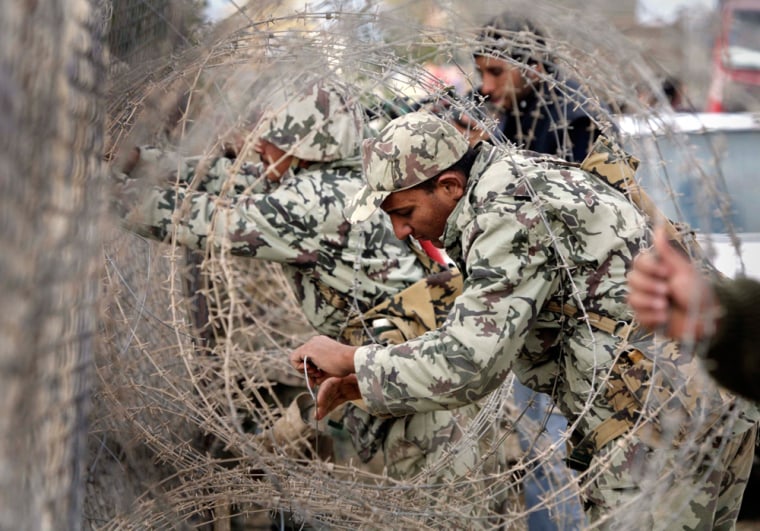Egyptian security forces and Hamas militants strung barbed wire across one of the openings in the Egypt-Gaza border Monday — a sign that a days-long breaching of the frontier may be nearing an end.
Three trucks of Egyptian security forces pulled up to the "Brazil" gate and strung wire across the entry point into Egypt. They were aided by half a dozen bearded and uniformed militants of Hamas, the group that controls the Gaza Strip.
At the main Salah Eddin gate, meanwhile, Palestinian and Egyptian security forces manned the crossing points, stopping civilian cars and letting trucks through, while pedestrians scoured the nearly empty stores for food and consumer products to take back to the Gaza Strip with them in fear of an imminent border reclosing.
"I said no Gazan cars with civilian plates can go through, only cars with truck plates are allowed. Do not argue with me. The orders have changed from above," one security guard told a man trying to ferry his Egyptian mother back across the border.
Shopping frenzy
Six days after Hamas blew holes in the border wall with Egypt to end a two year blockade and sent hundreds of thousands of Palestinians across the border in a shopping frenzy, authorities in the region are still struggling to come up with a new system to administer the border.
Egypt wants to restore shared control of the border among the Palestinian Authority, Israel, and European Union monitors, while Hamas rejects the old system and is pushing for a new one — presumably with more control in the hands of the militant group.
With much of the Arab world expressing deep sympathy for the plight of the Palestinians, Egyptian forces have moved very gingerly in stemming the flow of Gazans seeking food and supplies after nearly a two year blockade.
The fence is the first attempt to close one of the main crossing points, though Egyptian security forces earlier began stopping supplies from reaching the divided border town of Rafah to discourage Palestinian shoppers — leaving many local shopkeepers worried about the future.
"Since I opened this shop more than 20 years ago, I haven't seen such a chaotic situation, if this keeps up, the Egyptians in Rafah will be starving to death," said Mohammed Barahmah, 60, who owns one of the biggest grocery shops in downtown Rafah. "This is terrible, (Egyptian) Rafah will turn into Gaza, there will be nothing to buy and if there was it would be ten times the price."
Outside Rafah, lines of trucks with Cairo plates could be seen stopped at checkpoints and being sent back to the capital. But security officials in Cairo, speaking on customary condition of anonymity, denied any shipments to Rafah were being blocked.
Shared control disputed
The border cannot ultimately be reclosed, however, until a new system to replace the sharing arrangement brokered by Secretary of State Condoleezza Rice in 2005. Egypt and Arab foreign ministers have supported a return to the 2005 arrangement involving the Palestinian Authority — something vociferously opposed by Hamas.
But Hamas wants a new Rafah security scheme, calling the old one a piece of "history."
"This agreement has become part of past history, and the Palestinian people will not accept turning back to the old procedure," said Sami Abu Zuhri, a Hamas spokesman in Gaza City.
Hamas says its main objection to the old system is that Israel uses cameras and computers to track everyone who passes in and out of Gaza, even though the Jewish state pulled its citizens out of the strip in summer 2005.
But while it does not say so publicly, the militant group could also be seeking to wrest the Palestinian Authority's share of responsibility for Rafah.
Hamas is dispatching a delegation to Egypt to discuss Rafah security Wednesday — the same day Abbas meets in Cairo with Egyptian President Hosni Mubarak.
But the rival Palestinian factions will likely meet separately with Egyptian officials. Abbas refuses to talk to Hamas until the group gives up control of Gaza.
